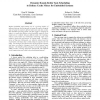Free Online Productivity Tools
i2Speak
i2Symbol
i2OCR
iTex2Img
iWeb2Print
iWeb2Shot
i2Type
iPdf2Split
iPdf2Merge
i2Bopomofo
i2Arabic
i2Style
i2Image
i2PDF
iLatex2Rtf
Sci2ools
111
click to vote
DATE
2008
IEEE
2008
IEEE
Dynamic Round-Robin Task Scheduling to Reduce Cache Misses for Embedded Systems
Modern embedded CPU systems rely on a growing number of software features, but this growth increases the memory footprint and increases the need for efficient instruction and data caches. The embedded operating system will often juggle a changing set tasks in a round-robin fashion, which inevitably results in cache misses due to conflicts between different tasks. Our technique reduces cache misses by continuously monitoring CPU cache misses to grade the performance of running tasks. Through a series of step-wise refinements, our software system tunes the round-robin ordering to find a better temporal sequence for the tasks. This tuning is done dynamically during program execution and hence can adapt to changes in work load or external input stimulus. The benefits of this technique are illustrated using an ARM processor running application benchmarks with different cache organizations and round-robin scheduling techniques.
Cache Misses | CPU Cache Misses | DATE 2008 | Hardware | Round-robin |
Related Content
| Added | 29 May 2010 |
| Updated | 29 May 2010 |
| Type | Conference |
| Year | 2008 |
| Where | DATE |
| Authors | Ken W. Batcher, Robert A. Walker |
Comments (0)

